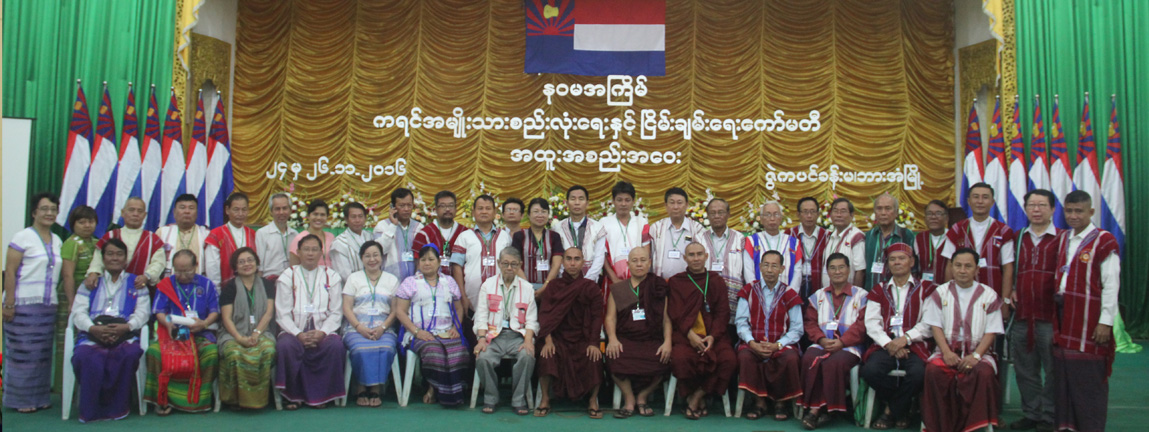
Karen Unity and Peace Committee - KUPC
Background History:
Ethnic Karen constitutes around 10% of the total population of the Union of Myanmar/Burma, depending on the source of data being referred to. In terms of geographical distribution, Karen people reside in significant numbers in 2 States (Karen and Mon) and 4 Regions (Ayeyarwady, Yangon, Bago and Tanintharyi) out of 7 States and 7 administrative Regions. Karen also reside inside the territory of the Union of Myanmar/Burma and there are Karen along the Thai-Myanmar/Burma border who are resistance armed forces, political activists, refugees and migrant workers. Another category of Karen has resettled all over the world in different countries for social, economic and political reasons. One thing all Karen people have in common is their love for their people, their culture, and their homeland. No matter where they are, they consider themselves as the stakeholders of the well being of the Karen people in their homeland. On the other hand, because of their life experiences, environment, and background they have a very diverse opinion on how to achieve the sustainable peace and development of their people in a homeland that is shared with many other ethnic groups.
It is a well-known fact that a group of Karen has resorted to holding arms to struggle for autonomy and self-determination for the last 63 years under the name of Karen National Union (KNU). Although all the Karen people did not join the KNU, there have been many different means and levels of support or sympathy to the KNU from most of the Karen people. Many ceasefire efforts between the KNU and the Government have been tried resulting in failure or fragmentation of the group. At this point in time there are at least 4 different groups, those who are still trying to reach ceasefire agreement, those who are still trying hard to maintain the ceasefire condition, those who broke the previous ceasefire agreement, and those who chose to reintegrate with the Government Military. This is simply put and generally categorized, and there are many gray areas that do not fall into these 4 categories.
For those Karen residing inside the 6 States/Regions of the country, there are differences in terms of their geographical identity, dialect, faith, and political affiliation. There are at least 11 major dialects, 2 major faiths and several political party lines. At 2010 election, 3 Karen political parties were established. At this point there are 4 registered political parties and the potential of several other parties to be established or re-established. Apart from that, there are many active Karen political leaders and members in large political parties such as National Unity Party and Union Solidarity and Development Party.
Introducation:
With the current change in the political landscape and the noticeable effort of the newly formed government towards the democratic change, many Karen as well as non-Karen in positions of leadership and responsibility, and seen by the community as leaders share the view that it is a critical window period of transition from now until 2015 election. Many conscientious Karen agree that the ethnic armed groups including the KNU should continue to strive for ceasefire and the ethnic communities should be actively involved in the emerging National political dialogue towards peace. Karen people at the grassroots, especially those whose lives are affected by the arm conflict, also make known their need for ceasefire, security and peace. They want a peaceful environment where they can lead their livelihood, and not depend on relief aids. All other Karen from different walks of life are interested in and also encouraged by the progress of the ceasefire agreement process and disappointed when the process is being threatened.
To bring the Karen people from different groups and places together to discuss this important crossroad, the first preliminary meeting of 50 Karen people from inside the country as well as from the border, widely referred to as Kawthoolei area, was held on 28th and 29th January 2013, at the Ancestors Memorial Hall, Hpa-an Anglican Diocese, Karen State. The outcome of the meeting was a ‘preliminary consensus’ to convene a Karen Affairs Seminar for wider consultations and preparation towards an All Karen Conference in the future. The prioritized issues to be discussed at the Seminar identified at this preliminary meeting were:
1. Unity for Karen People
2. Peace for Karen People and the Nation
3. An All Karen Conference that will focus on the future of Karen
A working group of 11 members was elected at the meeting to prepare for the Karen Affairs Seminar: 3 from the border region (including one Christian leader), 4 from Karen State (including two Buddhist monks), and 4 from in-Country-outside Karen State (including one Christian leader). The name of the group was given as the Working Group for Karen Affairs Seminar. The following is the names of the Working Group members.
1. Ashin Sandawara – Chairman of the Group
2. Ashin Agga Wuntha
3. Robert Htwe
4. Father Joseph Thein Khin
5. Mathew Aye
6. P’doh Saw Hla Tun
7. P’doh Saw Tah Doh Moo
8. Mahn Aung Pyi Soe
9. Saw Win Soe
10. Naw Rebecca Htin
11. Nant Khin Aye Oo



